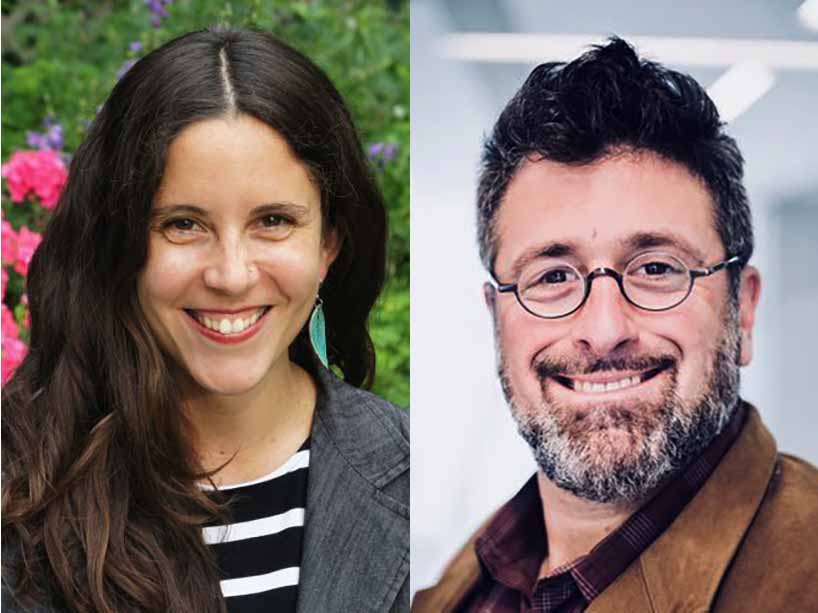Teaching grants fund projects to update curriculum for better learning outcomes

Magdalena Ugarte and Sean Wise benefitted from the Learning and Teaching Grant (LTG) Program for their projects that explore methods to improve the student learning experience.
What if you could modify curriculum to enhance the learning outcomes for both educators and learners? That is the aim of the Learning and Teaching Grant (LTG) Program, which supports projects that use evidence-based teaching methods to improve the student learning experience.
TFA faculty can apply to the program as principal investigators, with project proposals being accepted until Jan. 31, 2024 at 4 p.m. Faculty, contract lecturers, staff and students can be listed as co-investigators. Projects should focus on one or more of the eight priority areas, such as experiential learning, digital learning and educational technology, and Indigenous initiatives and decolonization.
An annual initiative facilitated by the Centre for Excellence in Learning and Teaching (CELT), the LTG program is funded by the Office of the Provost and Vice-President, Academic. It advances TMU’s commitment to teaching excellence and pedagogical leadership, with a particular emphasis on equity, diversity, inclusion, and accessibility (EDIA) in the classroom.
Magdalena Ugarte, professor in the School of Urban and Regional Planning (SURP) received a previous grant. Her project focused on Black studies curriculum and pedagogy. Ugarte and her co-investigators, Abigail Moriah and Simone Weir from the Black Planning Project (external link) , redesigned two courses within SURP through their LTG project.
The two courses – PLG 720: Advanced Planning Studio II and PLG 532: Field Research Project II – explored the historical and contemporary experiences of Black communities with planning in Canada. Ugarte, Moriah and Weir received funding from both the LTG and the Faculty of Community Services Anti-Racism Curriculum Development Fund, for a combined total of $16,000.
“The funding was crucial in allowing us to ‘scale up’ the project with the Black Planning Project and bring in other community partners as collaborators,” says Ugarte. “We were also able to provide workshops and training for students delivered by Black-led organizations or Black practitioners who were experts in areas like filmmaking, community-based research with Black communities and Afro-centric education.”
Students worked with four Black-led organizations in Halifax, Toronto and Vancouver – Akoma Holdings, Hogan’s Alley Society, A Different Booklist Cultural Centre (now called Blackhurst Cultural Centre), and Black Futures Now TO – to create mini-documentaries showcasing Black urbanism in those places (external link) .

A still from one of the mini-documentaries (external link) created by students in SURP about Hogan’s Alley (external link) in Vancouver’s Strathcona neighbourhood – once home to Vancouver’s Black population.
“The high-level of engagement and creativity from the students was really great to see,” says Weir. “These courses really helped to amplify Black voices and perspectives within urban planning, and allowed students to learn and work directly with the communities being impacted.”
Sean Wise, a professor in entrepreneurship and strategy at Ted Rogers School of Management, also received a grant for a current project. Wise’s project focuses on experiential learning, teaching students how to initiate and grow new ventures through hands-on experimentation.
Wise received a grant of just over $8,000, which allowed for the project to grow from one professor implementing the project in one course, to four professors across multiple courses (ENT 500: New Venture Creation and ENT 577: Entrepreneurial Sales).
Since the pandemic, the “side hustle” has grown as a popular form of entrepreneurship among students. Social media has become a critical tool to launch and market businesses and in some cases, leading to the rapid success of a new venture.
“The aim of the project is to show students just how difficult it is to go viral and experience first-hand how to initiate new venture sales without extensive resources,” says Wise. “Students learn that establishing a strong, reliable low cost sales channel is the key to meaningful new venture growth.”
As part of the course, students choose a product, such as home appliances, beauty products or phone accessories, to sell through Facebook or Twitter. A store called “Toronto Met Market” was established for the course to track the net and gross sales of each product. Students were exposed to various go-to-market channels, which refer to various marketing techniques a business uses to get its product off the ground, including marketing content and paid advertising, and learned how to generate insights for each channel.
They developed sales strategies and processes, experimenting with price points, shipping costs and marketing initiatives. Throughout the semester, students continue to evolve and improve their strategies, applying critical thinking skills and learning outcomes from their own reflections and analysis and coaching sessions and course concepts.
“Based on the data from our midterm report, we saw a continuous increase in orders and net sales over time, especially when students leveraged their personal networks,” says Wise. “As students continue to refine their sales strategies and capitalize on the resources provided, we can anticipate further growth and success, underscoring the positive impact of the project on both student development and overall market performance.”
To view the application requirements and learn more about the LTG Program, visit the Centre for Excellence in Learning and Teaching website. Applications may be submitted until Jan. 31, 2024 at 4 p.m.





